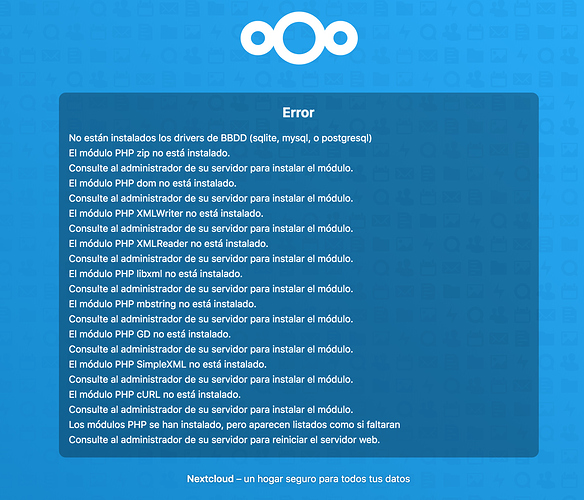Thanks a lot for your help.
Yes, I’ve tried installing all the modules and just tried again just in case. It says php7.4-zip (for example) is already in its most recent version.
Here’s the output for php -v and php -m:
pi@raspberrypi:~ $ php -v
PHP 7.4.3 (cli) (built: Feb 20 2020 14:15:45) ( NTS )
Copyright (c) The PHP Group
Zend Engine v3.4.0, Copyright (c) Zend Technologies
with Zend OPcache v7.4.3, Copyright (c), by Zend Technologies
**pi@raspberrypi:~ $ **
pi@raspberrypi:~ $ php -m
[PHP Modules]
calendar
Core
ctype
curl
date
dom
exif
FFI
fileinfo
filter
ftp
gd
gettext
hash
iconv
json
libxml
mbstring
mysqli
mysqlnd
openssl
pcntl
pcre
PDO
pdo_mysql
Phar
posix
readline
Reflection
session
shmop
SimpleXML
sockets
sodium
SPL
standard
sysvmsg
sysvsem
sysvshm
tokenizer
xml
xmlreader
xmlwriter
xsl
Zend OPcache
zip
zlib
[Zend Modules]
Zend OPcache
If I try to reinstall any module, it says its already in the latest version.
Example:
pi@raspberrypi:~ $ sudo apt install php7.4-zip
Leyendo lista de paquetes… Hecho
**Creando árbol de dependencias **
Leyendo la información de estado… Hecho
php7.4-zip ya está en su versión más reciente (7.4.3-1+0~20200220.11+debian10~1.gbpe23899).
0 actualizados, 0 nuevos se instalarán, 0 para eliminar y 20 no actualizados.
The last line says: “0 updated, 0 new will be installed, 0 to be deleted and 20 not updated”
" php7.4-zip ya está en su versión más reciente" means php7.4-zip is at the latest version.
Another example:
pi@raspberrypi:~ $ sudo apt install php7.4-SimpleXML
Leyendo lista de paquetes… Hecho
**Creando árbol de dependencias **
Leyendo la información de estado… Hecho
Nota, seleccionando «php7.4-simplexml» para el global «php7.4-SimpleXML»
Nota, seleccionando «php7.4-xml» en lugar de «php7.4-simplexml»
php7.4-xml ya está en su versión más reciente (7.4.3-1+0~20200220.11+debian10~1.gbpe23899).
0 actualizados, 0 nuevos se instalarán, 0 para eliminar y 20 no actualizados.
(Same result)
Any other ideas?
Thanks again,
regards.

